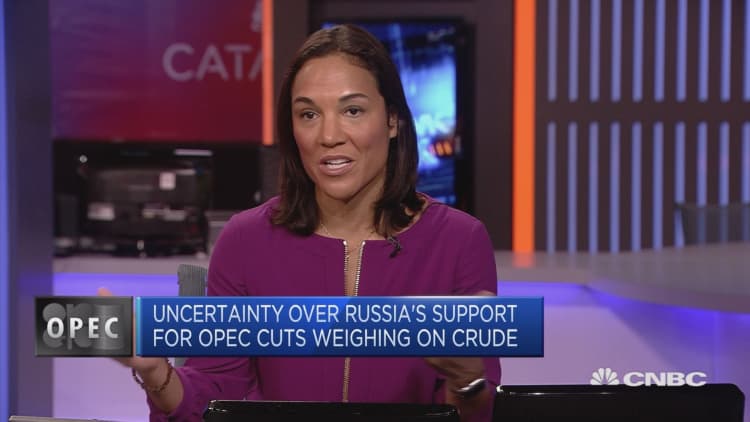Embattled Venezuela with its current political and economic turmoil should be front and center for oil traders as we head into 2018, according to industry experts and political analysts.
"The market is rebalancing, but there are still a number of producers that are poised for real challenges. I think Venezuela is the story we all have to watch in the first quarter of 2018 … We really have a country that is poised to go out of business," Helima Croft, head of global commodity strategy at RBC Capital Markets, told CNBC Tuesday.
On Sunday, Venezuelan President Nicolas Maduro announced that Manuel Quevedo, a former housing minister and major general in the National Guard (one of the country's armed forces), was to become the country's new oil minister and head of the state oil company PDVSA.
The move comes after the erratic president — branded a "dictator" by the U.S. — gave his support to a dramatic purge of the company with the arrests of 50 employees since the summer. There has also been several senior executives detained at the company's U.S. refinery subsidiary CITGO, on various corruption and embezzlement charges.

The crackdown comes amid wider economic turmoil in Socialist-ruled Venezuela with the major oil-producing nation struggling with hyperinflation (estimated by Venezuela's opposition party to hit around 1,400 percent in 2018), recession, food shortages and attempts to restructure foreign debt in order to avoid a default. This has put its entire economy, including its nationalized oil industry that accounts for most of the country's export revenues, in jeopardy.
Helima Croft echoed BP's Chief Executive Bob Dudley who told CNBC a few weeks ago that the OPEC member Venezuela was the biggest risk for the oil industry in 2018 and that the country was "defying economic gravity."
The future of PDVSA
Croft added that there were many question marks over the future restructuring of the state oil company, PDVSA, which has $45 billion in public external debts (around a third of Venezuela's entire external debt), according to one Reuters report.
"The question is whether the national oil company will? be facing a very destabilizing default situation? Will we have assets being seized? Just in the past week we've had a new general being appointed the head of the national oil company leading to real concerns about the outlook for Venezuelan production and it's a significant producer," she said.
Croft said that the general put in charge of the oil company had not had any experience working in the industry, as a former housing minister, and this lack of experience is not what the company needs.
On the domestic front, Maduro has surrounded himself with military figures that helped him to suppress public uprisings against his leadership, with Quevedo the latest to take a top job. The installation of Quevedo as head of PDVSA was politically motivated, according to an expert on Latin America.
"This is as much of a political rebalancing as it is an anti-corruption drive, though Maduro will be hoping a clean-up — or the appearance of a clean-up — will play well among voters," Nicholas Watson, senior vice president at risk consultancy Teneo Intelligence, said in a note Monday.
"But fundamentally, Maduro wants and needs PDVSA under the management of loyalists in order to ensure complete control over the distribution of rents. Putting the GNB (the National Guard, via Major General Quevedo) at the helm of PDVSA also incentivizes the military to remain loyal."
He also said that the corruption crackdown at PDVSA was part of Maduro's look-ahead to a presidential election due in 2018.
"Securing military and National Guard (GNB) support is already crucial, but will be more so if the economy sinks to new depths with even worse shortages of basic foodstuffs and medicines, and a hyperinflationary spiral," Watson said.


